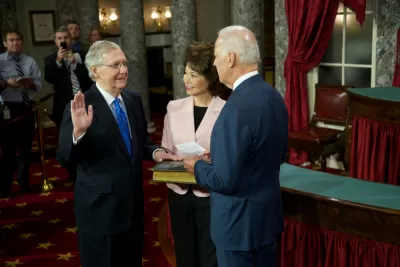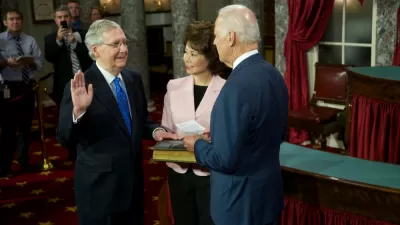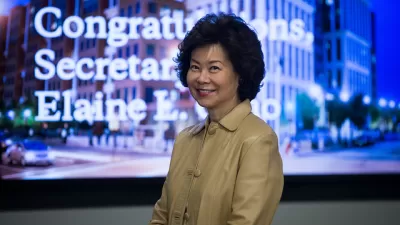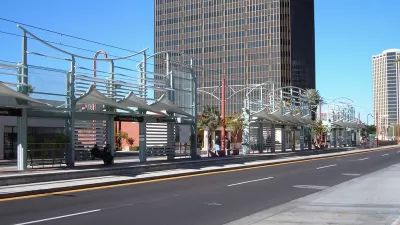The results of two recent investigations allege questionable ethical practices by U.S. Department of Transportation Secretary Elaine Chao, connected to the secretary's family shipping business and marriage to Senate Majority Leader Mitch McConnell.

Michael Forsythe, Eric Lipton, Keith Bradsher, and Sui-Lee Wee report for the New York Times on ethics questions leveled at U.S. Department of Transportation Secretary Elaine Chao in connection to special requests benefitting family members representing their shipping business, Foremost Group.
Ms. Chao’s office had made a series of unorthodox requests related to her first scheduled visit to China as a Trump cabinet member, according to people with knowledge of the email. Among them: asking federal officials to help coordinate travel arrangements for at least one family member and include relatives in meetings with government officials.
In China, the Chaos are no ordinary family. They run an American shipping company with deep ties to the economic and political elite in China, where most of the company’s business is centered. The trip was abruptly canceled by Ms. Chao after the ethics question was referred to officials in the State and Transportation Departments and, separately, after The New York Times and others made inquiries about her itinerary and companions.
The State Department decided that the business interests of those family members could be affected by those meetings. Former members of the State Department are on the record in the article saying the requests were "alarmingly inappropriate."
For the record, the article makes it clear that Secretary Chao does not have a stake in the family's shipping business. "But she and her husband, Senator Mitch McConnell of Kentucky, have received millions of dollars in gifts from her father, James, who ran the company until last year. And Mr. McConnell’s re-election campaigns have received more than $1 million in contributions from Ms. Chao’s extended family, including from her father and her sister Angela, now Foremost’s chief executive, who were both subjects of the State Department’s ethics question."
While there is a lot more to unpack in the New York Times article, that mention of Chao's husband, Senate Majority Leader Mitch McConnnell segues into the second scoop, written by Tucker Doherty and Tanya Snyder for Politico, revealing more potentially troubling conflicts of interest flowing through Secretary Chao's office:
The Transportation Department under Secretary Elaine Chao designated a special liaison to help with grant applications and other priorities from her husband Mitch McConnell’s state of Kentucky, paving the way for grants totaling at least $78 million for favored projects as McConnell prepared to campaign for reelection.
Chao’s aide Todd Inman, who stated in an email to McConnell’s Senate office that Chao had personally asked him to serve as an intermediary, helped advise the senator and local Kentucky officials on grants with special significance for McConnell — including a highway-improvement project in a McConnell political stronghold that had been twice rejected for previous grant applications.
The story revealed by Doherty and Snyder broadens the scope of implications of the alleged conflict of interest to planning and development outcomes in Kentucky. The grants went toward projects in the city of Owensboro. The city includes a plaza named for Senator McConnell, and now two projects benefitting from a federal grant achieved by Inman's involvement: "a plan to upgrade road connections to a commercial riverport and a proposal to expedite reclassifying a local parkway as an Interstate spur, a move that could persuade private businesses to locate in Owensboro."
The process by which this grant was awarded, along with another grant awarded to Boone County, "highlight the ethical conflicts in having a powerful Cabinet secretary married to the Senate’s leader and in a position to help him politically."
FULL STORY: A ‘Bridge’ to China, and Her Family’s Business, in the Trump Cabinet

Maui's Vacation Rental Debate Turns Ugly
Verbal attacks, misinformation campaigns and fistfights plague a high-stakes debate to convert thousands of vacation rentals into long-term housing.

Planetizen Federal Action Tracker
A weekly monitor of how Trump’s orders and actions are impacting planners and planning in America.

San Francisco Suspends Traffic Calming Amidst Record Deaths
Citing “a challenging fiscal landscape,” the city will cease the program on the heels of 42 traffic deaths, including 24 pedestrians.

Adaptive Reuse Will Create Housing in a Suburban Texas Strip Mall
A developer is reimagining a strip mall property as a mixed-use complex with housing and retail.

Study: Anti-Homelessness Laws Don’t Work
Research shows that punitive measures that criminalized unhoused people don’t help reduce homelessness.

In U.S., Urban Gondolas Face Uphill Battle
Cities in Latin America and Europe have embraced aerial transitways — AKA gondolas — as sustainable, convenient urban transport, especially in tricky geographies. American cities have yet to catch up.
Urban Design for Planners 1: Software Tools
This six-course series explores essential urban design concepts using open source software and equips planners with the tools they need to participate fully in the urban design process.
Planning for Universal Design
Learn the tools for implementing Universal Design in planning regulations.
Heyer Gruel & Associates PA
JM Goldson LLC
Custer County Colorado
City of Camden Redevelopment Agency
City of Astoria
Transportation Research & Education Center (TREC) at Portland State University
Jefferson Parish Government
Camden Redevelopment Agency
City of Claremont





























